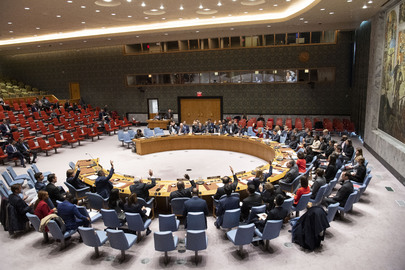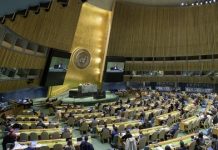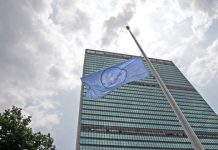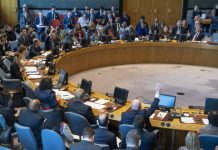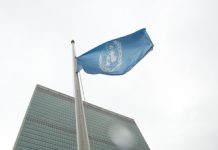UNRWA cannot be replaced, say UN top officials in response to Knesset ban
Top UN officials continued to line up on Tuesday to defend the irreplaceable role of the global body’s agency for Palestine refugees, UNRWA, insisting that if implemented, the Israeli parliament’s decision to ban it would only deepen suffering in Gaza.
After UN Secretary-General António Guterres warned that the ban would likely have “devastating consequences”, as UNRWA is the principal deliverer of aid relief inside Gaza, UN human rights chief Volker Türk called the Knesset move “deeply troubling”.
Head of the UN migration agency, Amy Pope, told journalists that UNRWA had been “the backbone of infrastructure” in Gaza for decades:
“They provide education, they provide healthcare, they provide some of the most basic needs for people who have been living there for decades. That’s not something that IOM does.”
In a statement, UNRWA Commissioner-General Philippe Lazzarini said that the agency was under unprecedented attack – physically, politically and operationally.
He warned that implementation of UNRWA’s mandate “may become impossible without decisive intervention” by the UN General Assembly, which created UNRWA and gave it its unique mandate.
Mr. Lazzarini added that Monday’s votes in the Knesset if implemented would deny UNRWA the protections it needs to function.
The new laws would forbid Israeli officials from working with his agency and also forbid UNRWA from operating in the Occupied Palestinian Territories – land which Israel regards as its own.
Sudan’s humanitarian situation is ‘catastrophic’, warns UN migration agency
Sudan’s humanitarian situation is “catastrophic” and deteriorating after more than 18 months of war, with 11 million people now displaced inside the country and another 3.1 million sheltering beyond its borders, the UN migration agency said on Tuesday.
Some 200,000 people were uprooted in September alone as a result of ongoing heavy fighting between the Sudanese Armed Forces and rival Rapid Support Forces, according to data from the International Organization for Migration, IOM.
In a related development, the UN human rights office, OHCHR, expressed deep concern about escalating hostilities and violence in Sudan’s Al-Jazirah state.
OHCHR spokesperson Seif Magango said that attacks by RSF militia on villages in Al-Jazirah state had increased in apparent retaliation for the recent defection of a commander to forces loyal to Sudan’s military government:
“On Friday 25 October, at least 124 people were reportedly killed in an attack by RSF ground forces on Al-Seriha village…This incident follows at least two other attacks by RSF ground forces on the nearby towns of Tamboul and Rufaa earlier in the week. Reports suggest hundreds of people were killed in Tamboul.”
Sexual violence has been reported “in multiple villages” in one locality, the UN human rights office spokesperson said, affecting three medical personnel and an 11-year-old girl, who later died.
Healthy diet take-aways from UN are all about balance, diversity and moderation
Health news now, and a gentle reminder from UN food experts that eating healthily is crucial to addressing chronic nutritional deficits affecting hundreds of millions of people globally.
One of the latest recommendations from the World Health Organization (WHO) and the Food and Agriculture Organization (FAO) is that eating adequate amounts of iron-rich food could help more than half a billion women who suffer from anaemia today.
Foods that are rich in iron include meat, peas, beans and dark leafy vegetables, such as spinach.
The UN agencies noted that good nutrition is dependent on eating a balanced amount of protein, fat and carbohydrate.
If children are given all three of these food groups, they will grow and develop healthily, potentially pulling millions out of poverty.
WHO and FAO also urged people to try to eat a diverse range of foods, aiming their advice at pregnant and nursing mothers, as this could save more than two million lives of children under-five every year.
According to a recent report from the FAO, more than a third of the world’s population could not afford a healthy diet in 2022.
Daniel Johnson, UN News
Music composed and produced by Joachim Harris. All rights reserved
Source of original article: United Nations (news.un.org). Photo credit: UN. The content of this article does not necessarily reflect the views or opinion of Global Diaspora News (www.globaldiasporanews.com).
To submit your press release: (https://www.globaldiasporanews.com/pr).
To advertise on Global Diaspora News: (www.globaldiasporanews.com/ads).
Sign up to Global Diaspora News newsletter (https://www.globaldiasporanews.com/newsletter/) to start receiving updates and opportunities directly in your email inbox for free.


